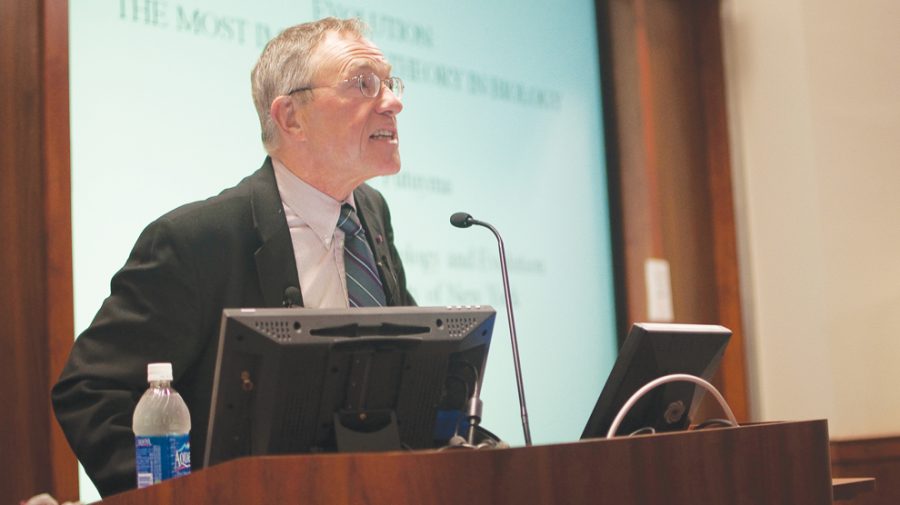The Alabama Lectures on Life’s Evolution Series hosted guest lecturer Douglas Futuyma, a leading researcher in evolution science, Thursday night. Students, faculty and community members gathered to hear Futuyma’s lecture, “Evolution: The Most Important Theory in Biology.”
Futuyma has written several textbooks, including “Evolutionary Biology” and “Evolution,” which are used in science classes on campus.
“His reference book is the book that our professors use to explain things that our textbooks don’t do well, so I’m really interested in hearing this lecture,” said Danielle Porter, a biology major.
Introduced as a leader in evolutionary biology, Futuyma began his lecture by asserting that evolution is both fact and theory – a notion he admits can be somewhat confusing.
“We have two words which are very loaded words,” Futuyma said. “Theory is usually the notion that it is an undemonstrated possibility with very little evidence. However, scientific theory is not a mere speculation or hypothesis, but a statement of well-supported general principles and laws, a complex of statements that together explain many phenomena.”
After outlining the characteristics of a scientific theory, Futuyma described what the science of evolution was concerned with studying and explaining: inferring the history of life and understanding the causes of evolution.
Futuyma spoke on changes in populations based on natural selection and DNA mutations before describing the ways evolutionary science is not just concerned with the past, but is useful in studying current issues as well.
“We’re getting very rapid evolution of resistance to drugs – antibiotics – in pathogenic organisms, bacteria and viruses of all kinds,” he said. “This is one of the major, major issues in infectious disease control. As you know, one of the major problems of controlling HIV is that the population of viruses within an individual person is rapidly evolving.”
At the conclusion of the lecture, the floor was opened up to questions from the audience. Several questions from the audience confronted the idea of why there is so much resistance to evolution when it is so well supported by scientific evidence.
According to Futuyma, evolution has been resisted since its early days, often because some people believe it contradicts deeply held religious beliefs. However, Futuyma said there are also people who do have strong religious beliefs and accept the theory of evolution.
Futuyma said some resistance to evolution is probably because of the somewhat “unpalatable realities of natural selection,” such as instances of infanticide seen in lion prides or the siblicide that several species of birds practice.
According to Leslie Rissler, a UA professor of biological sciences, people resistant to evolution should take the time to learn more about it.
“It’s so misunderstood, especially in a conservative environment. Unless you know the facts, unless you know the evidence, you should not dismiss it,” she said.
Rissler said Futuyma’s lecture and the ALLELE series are important events for students of a liberal arts university to take advantage of.
“It broadens your mind and exposes you to ideas you may never have been exposed to as young child,” she said. “Ideas like evolution, the most fundamental concepts of biology, should be understood by every educated person on the planet.”







